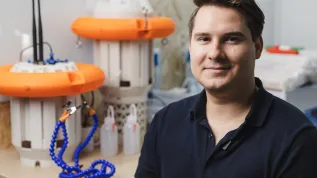
The project of an innovative stratospheric drone, research on the use of iron oxide nanoparticles in the treatment of cancer and analysing the properties of hexapawn are the three Polish projects presented during the finals of the EU Contest for Young Scientists (EUCYS) in Sofia.
The European Union Contest for Young Scientists has been organized by the European Commission since 1989.
This year, 100 research projects, whose authors are 155 students from 34 countries, entered the finals of the competition. All projects were prepared before their authors graduated from high school.
Among the participants of EUCYS in Sofia there are five Polish finalists - first place winners in the Polish edition of the competition.
Nineteen years old graduate of the J. Zamoyski High School no. 18 in Warsaw Antoni Lis is a chemist. As he explained in an interview with PAP, his idea involves using iron oxide nanoparticles in anti-cancer therapy. Nanoparticles are supposed have a triple action. Firstly, they will transport the drug precisely to cancer cells; secondly - thanks to their magnetic properties - they are to be heated to a high temperature (about 40 degrees Celsius) and destroy tumour cells. The third element that is expected to lead to the destruction of the tumour is the incorporation of radioactive element in nanoparticles. the young chemist describes the combination of these three methods as "triple synergy".
The teenager spent dozens of hours in the laboratories of the Faculty of Chemistry of the University of Warsaw. In an interview with PAP, he emphasizes that this was possible only thanks to his participation in the internship as part of the "Young Chemist University" program. This initiative is aimed at enabling a faster entry of talented young people into the world of science. During the program, he became interested in nanotechnology.
In the opinion of the jury, which selected him to the group of the Polish finalists, Lis` research may find practical application in the future: it broadens the knowledge on the effective treatment of cancer. Lis emphasized that his work is only in an early stage: he performed experiments on cancer cells derived from mice. However, he believes his concept has potential. In the future, it may be possible to achieve similar treatment efficacy with significantly smaller anti-cancer drug doses. "These drugs are very devastating for the human body" - he noted.
In October, the young chemist begins his studies at the College of Inter-Faculty Individual Studies in Mathematics and Natural Sciences, with chemistry as his major.
A team composed of Łukasz Gałecki, Mateusz Mazurkiewicz and Jan Struziński are also competing for the main prize. Graduates of The Navy High School no. 3 in Gdynia designed and built the prototype of the glider drone Ikar. It is designed to help researchers (including climatologists and astrobiologists) to conduct experiments in the stratosphere. The originators explain that research loads sent with stratospheric balloons are blown by the wind, which hinders and sometimes prevents their recovery and analysis.
"Our solution to this problem is a stratospheric drone. Initially, it is lifted on a balloon, then detaches from it and returns by autonomous flight along with the research load to its launch site" - they explain.
The invention has already been put to practical tests, all of them successful. "When we talked to people who know this (issue - PAP), we were told that this could not be done (...). The three of us proved that it was possible" - Łukasz Gałecki emphasized in an interview with PAP. He added that the design and construction of the drone required a huge amount of work, taking into account a large number of factors and the introduction of multi-level drone security. Young designers had the support of JIT Team and Pelixar S.A.
The project authors decided not to commercialise their invention. They plan to make it available in free access in the Creative Commons domain. This means that everyone will soon have access to the technical details of the project, the models needed to make the drone and its schematics. This solution can be used successfully by scientific institutes, which - as young designers note - are often underfunded.
"The interest in the drone is great" - Mateusz Mazurkiewicz told PAP. As he mentioned, after the conferences and presentations, other designers, hobbyists and company representatives approach his team with numerous questions.
Three young constructors have just started studies at the Faculty of Aerospace Engineering at TU Delft in the Netherlands.
Poland is also represented at EUCYS 2019 by mathematician Paweł Sawicki, who researches the properties of hexapawn. This game, invented by an American popular mathematics and popular science writer Martin Gardner, was designed to illustrate the basics of machine learning and is associated with the development of artificial intelligence. Sawicki, like the originator of the innovative drone, is a graduate of The Navy High School no. 3 in Gdynia. His considerations contained in the article "Hexapawn elongated", in addition to applying generalized results to games other than hexapawn, open the possibility to further study the effectiveness of machine learning and artificial intelligence development. The Polish jury, which selected the mathematician for the finals, emphasized that his work was substantively impressive and would even be suitable for a master`s thesis.
Sawicki said in an interview with PAP that he was interested in hexapawn because of its chess-like mechanics (Sawicki is an avid chess player). When the young mathematician learned about hexapawn, he was convinced that someone had already solved the game, that is, described the rules of the optimal game that would lead to victory. It turned out that this was not true, so he decided to tackle this problem.
"Many people mistakenly imagine that this research involved playing numerous games. This is a completely wrong idea, because nobody does this way" - said Sawicki. He noted that he used mathematical methods. "The first thing I did was getting rid of the board and the pieces. Instead, I used the integer functions" - he explained.
Sawicki currently studies mathematics and computer science at the University of Gdańsk.
The information made available by the National Children`s Fund shows that in terms of the number of prizes won in the EUCYS finals, young researchers from Poland are second only to Germans. To date, Polish participants have won 25 main prizes (8 first, 9 second and 8 third prizes) and 29 additional prizes.
The winners of this year`s contest will be announced on Tuesday. The jury will award four equivalent cash prizes - from the first to the third place. A number of special prizes are also planned.
The competition is open to authors of original, independent research projects aged 14-21, who have not completed their first year of study in the year of their EUCYS application. The National Children`s Fund has already begun recruiting for the next edition of the competition. (PAP)
Author: from Sofia, Szymon Zdziebłowski
szz/ jjj/ kap/
tr. RL













